Arts & Culture

In The Inheritance, currently on Broadway through mid-March, a century-old English novel (E.M. Forster’s Howards End) gently soundtracks, or perhaps orchestrates, the lives of gay men in their 30s during the period when President Obama was moving out of office, President Trump was moving in, and many of us wondered just where on earth we were.
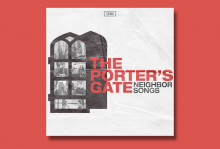
Words of Life
More than 50 songwriters, musicians, pastors, and theologians collaborated to create Neighbor Songs. This second project from The Porter’s Gate brings people from different backgrounds and traditions together to explore themes of justice, doubt, and lament through musical worship. Integrity Music.
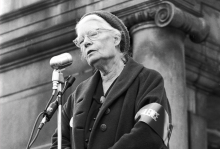
WHEN POPE FRANCIS addressed Congress during his 2015 visit to the U.S., he named four great men and women whose legacies helped shape the fundamental values of the American people: Abraham Lincoln, Martin Luther King Jr., Thomas Merton, and Dorothy Day, the Catholic social activist and pacifist. It was among his most audacious statements during the trip, and he got away with it because—outside of churches and the peace movement—Dorothy Day, the woman who could become America’s next saint, is largely unknown.
Revolution of the Heart: The Dorothy Day Story, a new documentary film by Martin Doblmeier, wants to put that right. More than a biography, this tapestry of archival footage and new interviews—which include Day’s granddaughters, plus devotees such as Martin Sheen and Sister Joan Chittister—is narrative theology, an argument for why an anarchist grandma could be a patron saint for those countering Trump’s America. “Dorothy Day spoke out publicly and forcefully in support of fair pay for workers, against the great imbalance of wealth, excessive expenditures for weapons, nuclear proliferation, and unjust wars overseas. We struggle with these same issues today,” Doblmeier tells me. He believes her life story is a roadmap, a spiritual guide for troubled times.
The film opens not with Day’s birth in 19th century Brooklyn, nor the years before her conversion, which she spent darting from bohemian parties to inner-city Masses, but in the 1950s, when the Catholic Worker movement she co-founded as a network of “houses of hospitality” took to the streets to protest the arms race. We see Day’s Catholic personalism—her belief that Christians must take personal moral responsibility for injustice—in action, and it is bracing and alienating. We meet her isolated from the Catholic Church: a voice crying in the wilderness. Doblmeier’s nods toward contemporary politics make this a challenging introduction. “I think Dorothy Day presents a direct path that we all can take,” he explains. “She believed if you see someone in need, you fix it yourself. You don’t wait for the government or a social service agency to intervene.”

THE NOVEL BEGINS with a nightmare from the 10th year of Nero’s reign, 64 C.E. “Rome was burning, would not stop burning ... the screams of adults and children, burning.”
Priscilla, or Prisca, is just waking up from a bad dream. An early Christian believer from “Roma,” wife of Aquila, a leatherworker like “Paulus,” and a house church leader (Acts 18:18-28; Romans 16:3-5; 1 Corinthians 16:19), Prisca is now a widow with an adopted daughter. The nightmare encourages her to record her life story.
Author Ben Witherington III is a professor of New Testament at Asbury Theological Seminary and a prolific writer. With his imagination, New Testament mentions of Prisca, and knowledge of the culture and politics of the Roman Empire, Witherington creates a dramatic account of the first century church, as told by an early leader.
He first portrays Prisca as a young freedwoman adopted by her childless mistress. She is named Priscilla after her adoptive mother and given Roman citizenship. The elder Priscilla was a Jewish adherent, so devout that she traveled to Jerusalem for the feast of Shavuot (in Greek, “Pentecost”), taking her adopted teenage daughter with her. By coincidence, the festival that year ushered in the descent of the Spirit and the birth of the church. Thus Prisca became part of the Jesus movement from the beginning.
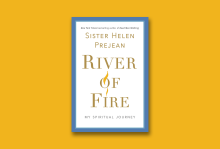
THE FINAL WORDS of Sister Helen Prejean’s new book River of Fire are the first lines of her most famous book, Dead Man Walking. But it is a different Prejean we meet in the River pages: Not the heroic anti-death penalty activist we hear on the news, but a young Louisiana woman on fire for God.
Raised in a loving Catholic family, Prejean entered the novitiate in the strict 1950s. Her descriptions of almost military-like training—no friendships allowed, eyes modestly downcast, sinners wearing vices written on cards around their necks—made me grateful I never became a nun. Once Prejean took her final vows, however, she only had a few years to adjust to the restrictive life before the Catholic Church experienced the seismic shift of the Second Vatican Council.
Prejean makes this transformative time come alive, even relaying how two men almost came to blows over the changes at a parish discussion group she facilitated. Vatican II meant no more Latin Mass or memorization of the catechism. Catholics were now expected to be truly educated about their faith and motivated more by love than fear.
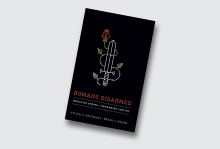
FOR MANY OF us, Romans is the most comforting and infuriating book of scripture. We rest easy in God’s grace in chapters three through five and the assurance that all will be well in chapter eight. But we chafe at chapter one’s exclusion of certain people and chapter 13’s apparent baptism of worldly power.
Sylvia C. Keesmaat and Brian J. Walsh are here to help. In their book Romans Disarmed: Resisting Empire, Demanding Justice, they read Paul’s letter through the lens of homemaking. All the discipline and love of the letter centers on God’s people making a home in the center of a home-breaking empire, and on God’s invitation to humanity to come home to God. Following the strategy of their book Colossians Remixed, Keesmaat and Walsh paraphrase passages of Romans to clarify its application to readers’ lives, and provide a fictional account of how two members of the ancient Roman congregation received the letter.
Wait a minute. They include fiction in nonfiction?
Yes, and here’s the most noticeable interpretive move they make: inserting questions and comments from an artificial, skeptical dialogue partner.
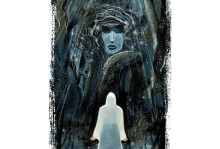
I can tell from the way
they are staring at shadows on the ground
that the voice-bearers have come
from that place where
trees are not life-giving.
Two nights ago, One was here with them
Whose longing, love, and pain woke my soul,
deep-buried,
which sleeps through winter,
moth-like.
He is not here with them now.
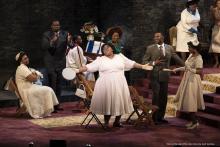
When’s the last time you saw a play in which the main character was a black woman? If you’ve never seen one, you’re likely not alone. Although it’s the year 2020, and within the past year Slave Play and American Son were on Broadway, the number of American plays with black women as their leads staged in America still has immense room for improvement. As of today, zero are slated to appear on Broadway during the rest of the 2019-2020 season and the entirety of the 2020-2021 season. That’s why it’s shocking that, 55 years ago, The Amen Corner, a three-act play about a black woman pastoring a Pentecostal church in Harlem, N.Y., opened on Broadway, albeit more than a decade after its birth.
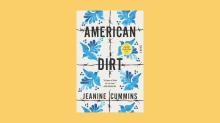
A commitment to justice or equality cannot be purely voyeuristic or touristic.

The prevailing stereotype of unpredictable and hypersexualized brown women’s bodies.

Many psychologists fear awe is receding from our lives and that a vital social resource is disappearing.

BY NOW THE sins of Facebook, as a social media platform and megacorporation, are well-known. You’ve got invasions of privacy, data breaches, viral falsehoods, livestreamed rapes and murders, and the list goes on.
Well, a few months ago, the volunteer technology committee at the Catholic parish where my wife, Polly, works as social responsibility minister did something about it. They asked their parish council to consider taking the congregation off Facebook entirely and no longer using the platform as a medium of communication. When Polly told me about this, I was a little surprised. Maybe I missed something, but, amid the sporadic calls to “Delete Facebook” in the wake of the company’s various scandals, I hadn’t heard of a religious community actually implementing a boycott.
Once you think about it, the arguments for boycotting Facebook are pretty obvious. When we lend our eyeballs to that platform, we bring it advertising dollars, helping to fund its corrupt and dangerous practices. And what’s worse, the company’s business model makes every person or organization with a Facebook page a recruiter for the company and turns every posted detail of our lives into a product (consumer data) that the company can sell to commercial and political advertisers. When a congregation encourages parishioners to log onto a church Facebook page and share what they find there with interested friends, the church places its members and friends at risk of having personal information exposed to bad actors.
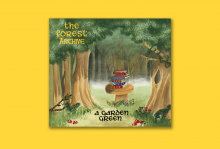
'Our Help Is In the Name'
Canada-based The Forest Archive drops a worship album celebrating the Songs of Ascents in Psalms 120 to 134. Mixing strings and percussion with energy and earthiness, A Garden Green is folk music that invites listeners to a deeper story of unfettered joy and resistance to injustice. theforestarchive.bandcamp.com.

IN BONG JOON-HO'S Parasite, being upper class means loving Western culture—and its colonialism.
Spatial metaphor structures the award-winning dark comedy from the Korean director. Families and living spaces are the primary characters and settings for the film. The poor Kim family lives in a cramped basement apartment, and the rich Park family lives high up in the hills of Seoul.
(Warning: Spoilers)
In the first half of the movie, the Kims’ son Ki-woo is hired as an English tutor for the Parks’ daughter, and the Kims scheme to get each member of their family employed by the Parks. Their plot runs smoothly, and the Kims relax at the Parks’ luxurious home while they are away. But the movie’s clean narrative line drops when a third family and their living arrangement are revealed. The former housekeeper returns to expose a subterranean bomb shelter in the Parks’ home where her husband has been living, unbeknownst to the Parks.
The former housekeeper and her husband sit even lower in the class hierarchy than the Kims by living completely below ground.

IN THEORY, FACULTY with tenure have safety to pursue academic freedom, but four years ago Dr. Larycia Hawkins, then an associate professor of political science at Wheaton College, exposed the reality that for women of color tenure is vulnerable, even to online trolls. When Hawkins became the center of a national controversy over a Facebook post expressing solidarity with Muslim women during a wave of anti-Muslim rhetoric sweeping the nation, her employer did not protect her. Instead, it hung her out to dry. Now Hawkins is at the center again, this time as the subject of the documentary film Same God, directed by Wheaton alumna Linda Midgett.
Wheaton, an elite evangelical liberal arts school in the Chicago suburbs, touts a proud abolitionist past as a stop on the underground railroad and the first institution of higher education in Illinois to admit a black man. “Doc Hawk,” as Hawkins’ students lovingly call her, was celebrated as the first African American woman to receive tenure in the school’s 159-year history.
Same God begins in the aftermath of the mass shooting on Dec. 2, 2015, in San Bernardino, by a Muslim couple influenced by Islamic extremism. Barack Obama was president and Donald Trump was on the campaign trail, promising a ban on all Muslims entering the country. Two days later, Jerry Falwell Jr. escalated tensions from a stage at Liberty University. “I’ve always thought if more good people had concealed carry permits, then we could end those Muslims before they walked in and killed us,” he said, after cavalierly asking the cheering audience if it was illegal to pull out the weapon he hinted was in his back pocket.

AT THE END of Jackie Sibblies Drury’s landmark drama “Fairview,” the audience faces a deep and enduring question: “Are we able to look through another’s eyes? Or are we merely reflecting on what we’re willing, what we want to see?” To bring us to the point where we’re able to make this query, Drury takes us on a ride through a landscape of African American theatrical tropes, sometimes familiar and sometimes unsettling, so that we are better able to face ourselves, as discomforting as that is.
The beginning seems fairly rote, as a family gets ready for a birthday party in an immaculately white living room. We could be in the home of the Huxtables, chuckling along with the laugh track. Beverly, the perfectionist mother who wishes for everything to be just right for Grandma’s celebration, hovers over all, brushing on the finishing touches.
But, if you look and listen closely, there are cracks that begin to show: the odd wavering of the soundtrack and teenage daughter Keisha turning to address the audience in a moment of Brechtian shock. Then we find that we are not seeing TV-perfect domestic bliss. Keisha comments on the beautiful perfection and longing for her bright future, standing at its threshold, just waiting to seize the day.
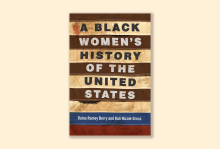
IN EARLY JANUARY 1600, Isabel de Olvera, a woman of African descent, petitioned the mayor of Querétaro, Mexico, for protection of her rights before joining Juan de Oñate’s expedition to New Spain, which consisted of several regions in North and South America, including present-day New Mexico, Arizona, and Florida. As she was about to embark on the journey with Spanish explorers, Olvera believed she would be vulnerable to violence or captivity. “I am going on the expedition,” she stated in her deposition, “and have reason to fear that I may be annoyed by some individual since I am a mulatto.”
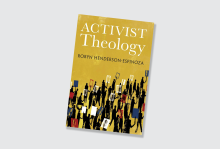
HISTORICALLY, THEOLOGY HAS worked a lot like Reaganomics. Those with access to academic ivory towers get to theorize about God and spiritual meaning. Often, watered-down versions of these theories reach the rest of the population through pastoral care professionals and the few thinkers and writers who strive to make theology accessible.
One of the primary goals of activist theology, described by theologian Robyn Henderson-Espinoza in their new book Activist Theology, is to reverse this flow of meaning-making. The work of activist theology “is to invest in community, so that knowledge production is not top down from the academy but begins on the ground to move to the middle and tip the top.”
What does it mean to “tip the top?” Ideally, a revolution.
This starts with recognition of how social and political systems of oppression are supported by what the author calls “theologies of white supremacy” and Christian supremacy. There is a long history of theological systems that have exposed these issues, such as queer, womanist, mujerista, and liberation and black liberation theologies.

A veteran slumped in a midnight
doorway was trained to kill, so killed,
and killing banished sleep.
A hurt child, now thirty-two, who
never had the food he needed, haunted
by his father’s blows, shoots meth.

There’s no such thing as an objective critic, or objective criteria by which any of us could judge a movie. The question is whether the critic, or the audience, is able to be honest about the criteria they are using. So I’ll say something I’ve said before: By my sights, the purpose of art is to help us live better, and the best cinema occurs when technical and aesthetic craftsmanship operating at their highest frequencies, and a humane concern for the common good, kiss each other.